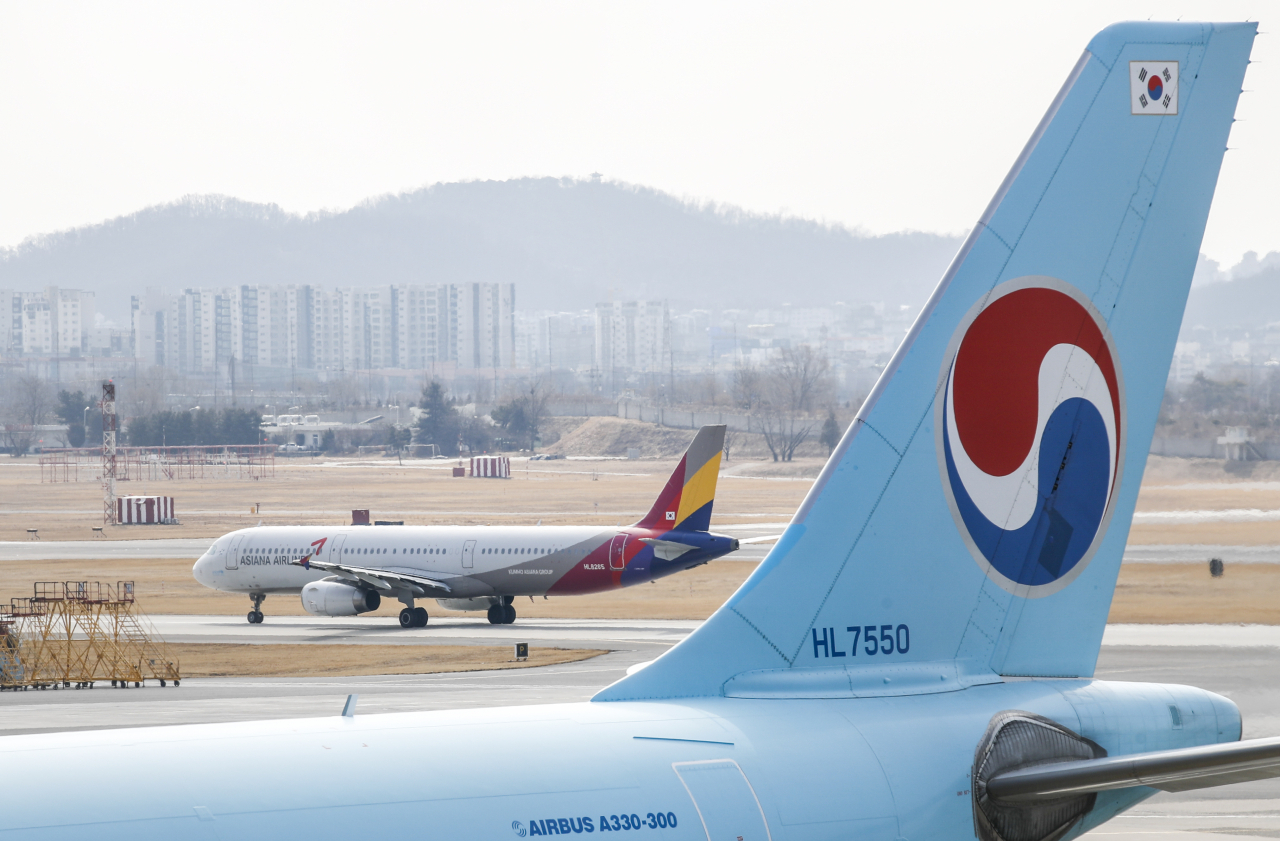[KH explains] Is a third-party buyout of Asiana Airlines around the corner?
Amid stalled antitrust approval on merger with Korean Air, strategic investors, including Hanwha, reportedly reviewing their chances
By Lee Yoon-seoPublished : Aug. 28, 2023 - 14:26

Amid ongoing delays in a high-profile merger between South Korea’s top two air carriers Korean Air and Asiana Airlines, some market watchers are speculating that strategic investors are preparing for a possible third-party buyout of Asiana.
Private equity funds are reportedly releasing requests for proposals to interested parties regarding the 1.8 trillion won ($1.3 billion) Korean Air-Asiana deal to solicit responses, according to some investors. The requests come amid delays in the deal due to international authorities’ antitrust concerns.
"It is possible that with foreign antitrust regulators stalling to make decisions regarding the (Korean Air-Asiana) deal, and with the deal having dragged for more than three years, some investors are looking for their chances to weigh in," said an official from a private equity fund on the condition of anonymity.
"If such a large-scale deal falls out, investors will need to make quick responses, and it is possible that they are making preparations in advance (for such a case)," he said.
The nation’s seventh-largest conglomerate Hanwha Group is rumored to be another player behind the scenes, currently gauging its foray into the Korean Air-Asiana deal.
In July, Hanwha Group reportedly contacted Pan Ocean -- a shipping company and a subsidiary of Korean agri-food giant Harim Holdings -- to offer a buyout of its stake in Hanjin Kal, the holding company of Hanjin Group. Hankin Kal maintains oversight of its subsidiaries, including Korean Air. Currently, Pan Ocean holds a 5.85 percent stake in Hanjin Kal, while Hanjin Kal owns a 26.13 percent stake in Korean Air.
The move is widely interpreted as a part of Hanwha Group's aim to make an inroad into the aviation industry, and possibly prepare a strategy in case the deal between Korean Air and Asiana falls through. The group has exhibited interest on numerous occasions in foraying into the aviation industry, in a bid to complete its vision of becoming a full-fledged company with a value chain across land, air and sea.
In 2017, Hanwha Group officially reviewed a takeover of Asiana Airlines when it invested 8 billion won to acquire domestic low-cost carrier Aero K. However, a year later, Hanwha decided to scrap its plan and retracted its investment after the Ministry of Land, Infrastructure and Transport revoked Aero K's air carrier license, citing its lack of both financial and operational capabilities.
"If Hanwha Group operates an airline carrier, it can expand its customer demographic by combining (the airline carrier business) with its retail sector such as hotel and resort businesses. Cooperation with its logistics subsidiary HanExpress for cargo transportation, and joint marketing with Hanwha Aerospace to supply Hanwha-produced parts to aircraft manufacturers, will also function as a boon to its business," said an analyst at a local firm on condition of anonymity.
However, the source added that in terms of Hanwha actually taking over Asiana, it is likely that Hanwha could merely be reviewing the case and its actual possibility of taking over Asiana is considered low -- as Hanwha has recently spent a significant amount of its assets during its takeover of Daewoo Shipbuilding and Marine Engineering.
In April, after gaining approval from seven foreign antitrust regulators including the UK, China, the European Union, Japan, Singapore, Turkey and Vietnam, Korea’s Fair Trade Commission approved Hanwha's acquisition of DSME. The deal cost a total of 2 trillion won for Hanwha.
"After spending trillions on (acquiring) DSME, Hanwha would need additional cash to normalize its losses -- as DSME has been suffering from continued sales deficits. With such a burden, it seems unlikely that in the near time, Hanwha would be willing to spend more cash on the takeover of Asiana, which will require investments well worth over a trillion won," he said.
In fact, in order to acquire Asiana Airlines, Korean Air has carried out a paid-in capital increase worth 2.5 trillion won. Out of the total funds, 1.5 trillion won are planned to be spent in acquiring Asiana Airlines' stocks, and 300 billion won are planned to be spent to issue Asiana's corporate bonds. The remaining 700 billion won are saved as a prophylactic for additional costs such as system integration between the two airline carriers, according to Korean Air.
Regarding rumors that Hanwha may be looking into acquiring Asiana, Hanwha denied all allegations that the company is reviewing an acquisition of the airline carrier.
"We did review the acquisition of Asiana Airlines in 2017 (when we attempted to acquire Aero K). However, there are no plans to acquire the company now, and the rumors circulating are not true," a Hanwha Group official said.
The state-run Korea Development Bank, the main creditor of Asiana Airlines, has also said via an official statement that they have no plans to sell Asiana to a third party.
Regarding reporting by a local news outlet that KDB Bank is currently looking for alternative options and therefore consulted with Samil PwC Accountings to sell Asiana to a third party in case the initial deal falls through, KDB Bank said such measure was in preparation for changes in the aviation market during the post-COVID-19 period.




![[Graphic News] Beer the most favored alcoholic drink by Koreans](http://res.heraldm.com/phpwas/restmb_idxmake.php?idx=644&simg=/content/image/2024/05/09/20240509050765_0.gif&u=)









![[Weekender] Pet food makers bet big on ‘recession-free’ pet food market](http://res.heraldm.com/phpwas/restmb_idxmake.php?idx=652&simg=/content/image/2024/05/10/20240510050754_0.jpg&u=20240511163252)




![[What to play] Musical tributes to family in the month of family](http://res.heraldm.com/phpwas/restmb_idxmake.php?idx=642&simg=/content/image/2024/05/09/20240509050795_0.jpg&u=)